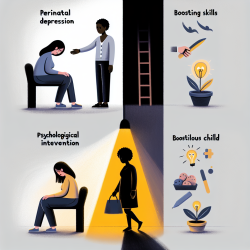Introduction
In the field of speech-language pathology and online therapy services, understanding the priorities and decision-making processes of both consumers and clinicians is crucial for improving treatment outcomes. A recent study, "Competing priorities in treatment decision-making: a US national survey of individuals with depression and clinicians who treat depression," sheds light on these dynamics, particularly in the context of depression treatment. This blog post will explore the findings of this study and how they can be applied to enhance decision-making and treatment outcomes in speech-language pathology and related fields.
Understanding Consumer and Clinician Priorities
The study surveyed 972 consumers and 244 clinicians to identify the most important factors when making treatment decisions for depression. The top priority for both groups was the effectiveness of the treatment. However, there were notable differences in other priorities. Consumers placed a higher emphasis on insurance coverage and treatment costs, while clinicians focused more on the treatment process and how it works.
Shared Decision-Making: A Key to Better Outcomes
One of the critical findings of the study is the low level of shared decision-making (SDM) reported by consumers. Only 18% of consumers felt they experienced high levels of SDM in their treatment decisions. This gap highlights the need for clinicians to engage more actively with consumers, ensuring that their priorities are addressed and integrated into the decision-making process.
Implications for Practitioners
For practitioners in speech-language pathology and online therapy services, the findings of this study offer valuable insights:
- Emphasize Effectiveness: Ensure that treatment plans clearly communicate their effectiveness and expected outcomes to consumers.
- Address Financial Concerns: Be proactive in discussing insurance coverage and costs with consumers, as these are significant concerns for them.
- Enhance Shared Decision-Making: Implement strategies to involve consumers more in the decision-making process, such as using decision support tools and ensuring ample time for discussions.
Encouraging Further Research
While this study provides a comprehensive overview of current priorities and decision-making processes, it also opens the door for further research. Practitioners are encouraged to explore how these findings can be applied in their specific contexts and to consider conducting their own studies to better understand the unique needs of their consumer base.
Conclusion
Aligning treatment decisions with consumer priorities is essential for improving treatment adherence, satisfaction, and outcomes. By understanding and addressing the competing priorities in treatment decision-making, practitioners can enhance the quality of care and foster better consumer-clinician relationships.
To read the original research paper, please follow this link: Competing priorities in treatment decision-making: a US national survey of individuals with depression and clinicians who treat depression.










